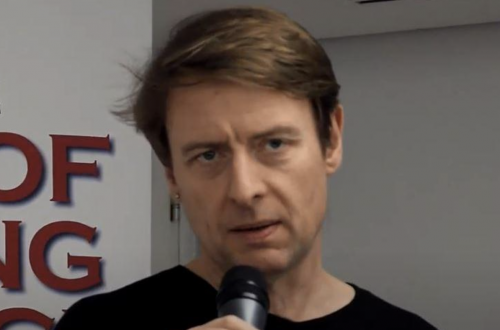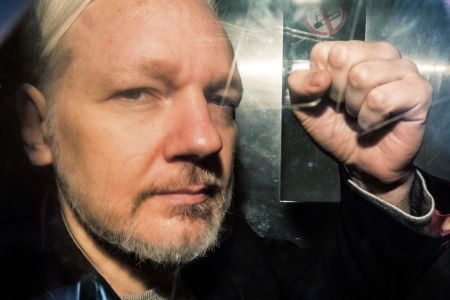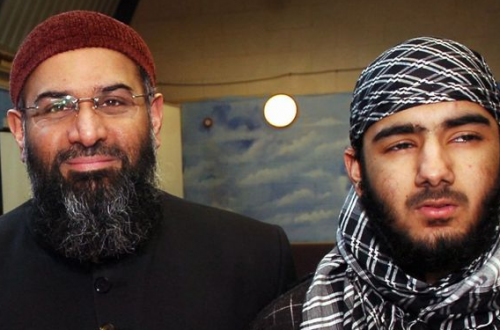This is a guest post by amie
The subject of the panel discussion last week was Does interfaith dialogue work?
For an incisive and rounded account of the evening, see Point of no Return, here.
You will find there some clues as to why the testimony of Sheik Al Hussaini made me stand up and declare how he had moved me to tears, and why this was greeted by a murmur of concordance from the audience. When I went up to him afterwards, he told me what I had said meant a lot to him, and told him briefly why his message had a special import for me.
The opening question, put by chair Martin Bright, was where do you draw the line and dialogue stops.
Had there been time, the full story behind my few choked words was in the question I wish I could have put to Rabbi Wittenberg: In the following case, at what stage do you stop the dialogue?
My son P went to the same school as Sheik Al Hussaini, (who told us 60% of his friends there were Jewish and the other 40% Christian). P’s best friend through school was a brilliant Muslim boy, until P came home distressed that the boy had started saying things like- the Holocaust didn’t happen and the newsreels about it were fabricated by Jews in Hollywood. I kept urging P that the important thing was to keep on talking- you can challenge and argue, but keep the bridge open, keep talking. Until the day he told P that there were no innocent Jews in Israel and that even babies had to be killed.
Sheik Al Hussaini’s message was particularly intense, given the strain he was under of recent and past threats for his forthrightness. He paid homage to his Jewish colleagues at Leo Baeck to whom he owed so much, as well as to his Orthodox Rov. He quoted with unaffected ease in Hebrew from the text calling on us to take care of the Ger (stranger.), before proceeding to an expose of what he called the Interfaith Industry. For him, this was where we say nice things we don’t mean to people we don’t really like.
He related how in an Interfaith community event, a good impression of Islam was maintained until over coffee the co-chair of one of the most senior interfaith organisations made the unguarded statement that Jews were a disease. He pointed out that one of the biggest funders of the Interfaith Industry is Saudi Arabia- it is a big public relations exercise for them. There are two faces of this Industry: one to the interfaith audience, while the other shows the face of right wing Islamists, and grinds down any dissidents. He spoke of how the MCB had blocked a moderate mosque to which he himself belonged.
He likened this culture of “double discourse”, to 1930s Germany, where there were honourable Germans who were not brownshirts but sat at the table with brownshirts, where there was ordinary, everyday Jew-hating talk.
At the same time, Sheik Hussainni said he was not a self hating Muslim, and resisted being cast as a member of some kind of Anglicanised Islam: He objected to the calls of Trevor Phillips for the kind of cohesion which was criticical of the segregation of Stanford Hill. He claimed one should be able to maintain separatism and not regress to an age of promoting only one religious confession.
His view of interfaith relations was exemplified by his enduring school friendships, and as a medic, he found the conversations around the water cooler far more profound than any engineered interfaith dialogue. He played the Irish fiddle in a band which is recording an album. This love of music, normality and naturalness was his way.
Rabbi Wittenberg said it took courage to undertake the often unpleasant task of, for example speaking as he did on TV broadcasts to the Arab world. It proved worth it when he was approached by some menacing looking Iranian men on the tube who recognised him and said they respected him. He took a lesson from his teacher Hugo Gryn who wrote that in his village in Europe, there were no efforts by non Jews to save the Jews, and he then realised that neither Jew or non Jew had ever set foot in the other’s place of worship.
Rabbi Wittenberg’s answer to Bright’s question was that he was very careful not to be co-opted, and that he discussed matters with the CST. He said it was too easy to accuse someone of supporting extremism by third degree association, i.e. “He sits with X who is associated with Y”.
Sheik Al Husseini answered by saying he will talk to anyone except liars, to people with a culture of not saying what you mean. He has inside knowledge of MCB training where one is trained to manipulate and to play on emotions and they promote a culture of not speaking the truth. One of his J core colleagues correctly said of her experience of one of their rallies as being theatre managed.
When he referred again to the disingenuousness that permeated the moneyed Interfaith Industry, asking pardon for his use of that term, which R Wittenberg disliked, R Wittenberg interjected heatedly that no, he couldn’t pardon that, actually.
To a question from the floor, What do we do about Jewish extremism?
R Wittenberg observed this was not a huge phenomenon.
S Al Hussaini said it was his job to be an advocate for his own faith. His Rabbinic colleagues fight their prejudices all the time, while, he pointed out, his voice full of pain, there are very, very few voices speaking up in the Muslim community against antisemitism.
A questioner challenged R Wittenberg: Would you dialogue with the BNP? The Rabbi wavered and hummed: this was a difficult moral question: “If I say I would not, I may have squandered an opportunity, no matter how slight to influence someone”.
“What about dialogue with a Nazi?” “Why are you asking me this?” he bridled.
Because, the angry questioner responded, you are “interfaithing” with the Nazis of Islam- the Jamaat -e-Islami.
Rabbi Wittenberg’s repeated: “I check with the CST”. Then there was this rider, which was such a bizarre non sequiter that I hope I missed the salient part of the answer. But all I heard is: “I am accused of undermining moderates, yet you get so called moderates using the f-word”.
Hoping to elicit a better response, I asked him to accept my question in a spirit of constructive inquiry, rather than interrogation:
“You said you are careful not to be co-opted by extremist elements. In what way have you shown that you are not co-opted? We have heard Sheik Hussaini’s heartfelt description of how Muslims like him are feeling desperately marginalised and demoralised. How can we help him, and how will you help him, by giving a public manifestation of how you are not being co-opted?”
He did not respond to my question.
The fiery challenger cornered Rabbi Wittenberg after the panel concluded, and confronted him with extracts from sermons and statements either given at ELM or proclaimed elsewhere by ELM speakers: How do you think I feel as a Jewish woman to hear that I am their rightful booty?
How do you think Bangladeshis feel about your association with Jamaat who are their killers?
(update: just the previous day Abdul Qader Molla, senior Jamaat-e-Islami party leader, was sentenced to life for crimes against humanity during 1971 war.)
I can take you to many fine mosques where you can do interfaith- why, she entreated, do you persist in associating with the one which reflects these positions?
His only response was to blurt “Thank you” as he darted away.
My son’s rift with his schoolfriend had a shattering effect on him, and was painful for me to see. I lost no time in telling him how Sheik Al Hussaini’s words, and just being the wonderful person he is, have had such a profoundly healing effect.


